Movie Review – Top Gun
Cornball Hollywood actioner is as testosterone-laden as they come – heck, it’s the mid-80’s after all – and Tom Cruise’s star was certainly about to explode on the screen; Top Gun is all blast and little blow. Dynamic dogfights elicit a thrill, and although the story grinds to a halt when the action takes to the ground, the charisma of this ballsy cast more than acclimate to a dearth of development beyond cliche. Top Gun is fun, overblown and frantic, but aside from its spectacular stunt sequences, is really rather stupid.
Principal Cast : Tom Cruise, Kelly McGillis, Anthony Edwards, Val Kilmer, Tom Skerritt, Michael Ironside, John Stockwell, Barry Tubb, Rick Rossovich, Tim Robbins, James Tolkan, Clarence Gilyard, Whip Hubley, Meg Ryan.
Synopsis: A young Naval pilot tests himself against the best to become a Top Gun.
It’s the ultimate need for speed.
Okay, so apparently there’s some folks who’ve never witnessed the birth of a Hollywood icon in Tom Cruise, as he catapults himself into the A-list with Top Gun, a bravado-ridden cliched monstrosity about Navy pilots pitting their nerves and wits against the best efforts of Hollywood screenwriters to make this film as idiotic as possible. Top Gun has become something of a minor cult classic, a flyby to the halcyon days when America was engaged in a Cold War with Russia – here, the “villains” are the faceless Russian MiG planes – and a time when muscular world powers seemed to play by their own rules. Top Gun’s puerile dialogue and hackneyed, cliched characters seems to run counter to the film’s breathless aerial sequences, all of which are (mostly) thoroughly convincing even by today’s CG-ridden standards. But it’s Cruise, Tom Cruise, who rules this film, with his wonky-toothed grin and shit-eating attitude giving Maverick, his cocky pilot character, the status of screen icon.
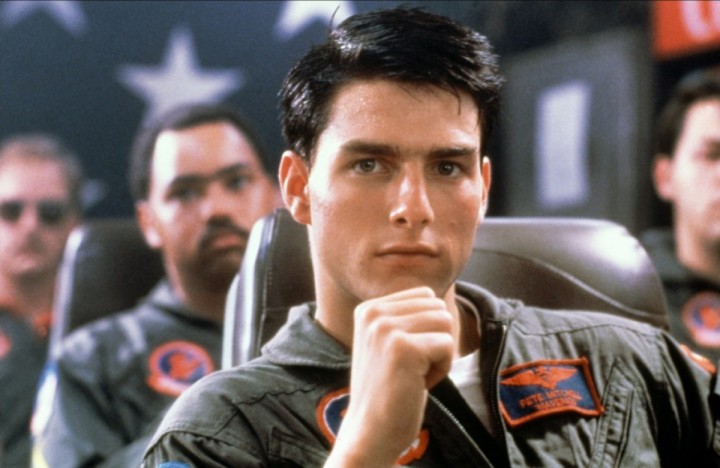
Lieutenant Pete “Maverick” Mitchell (Cruise) is a Navy Aviator (he’s a pilot) with a bad attitude to command and a willingness to defy orders. He, together with his co-pilot Nick “Goose” Bradshaw (Anthony Edwards), are sent by their commander, Stringer (Back To The Future’s James Tolkan) to the Navy’s Fighter Weapons School, otherwise known as “Top Gun”. There, they are schooled in the art of jet fighters, as the Navy attempts to lessen Maverick’s recklessness; Maverick meets civilian contractor Charlie Blackwood (Kelly McGillis), a flight instructor with whom he begins a romantic liaison. In spite of Maverick’s assurances that he’ll lift his game, his rule breaking and eventual association with the death of a fellow pilot lead Navy Chief Instructor, Commander Metcalf (Tom Skerritt) to offer him an ultimatum: return to flying and prove his quality, or quit and run. Maverick’s inquires into the death of his father in Vietnam, which he refuses to believe the official story, also provide much dramatic weight.
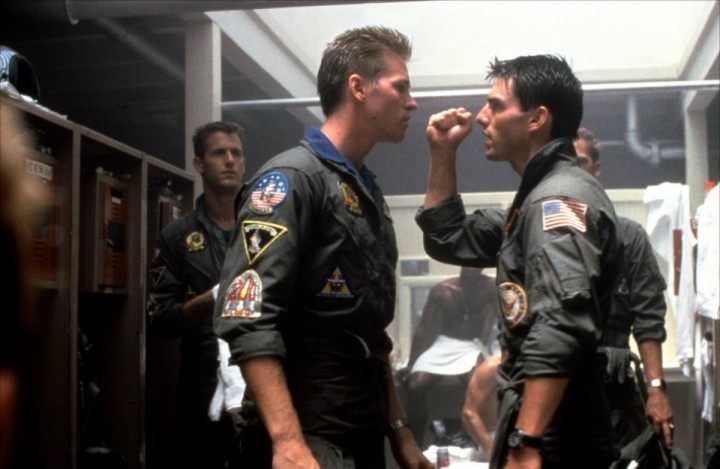
Looking back on Top Gun, from its blazing aerial dogfights to the warbling of Berlin’s Oscar winning song, “Take My Breath Away” (yeah, the Academy were hard up for nominees that year I guess), it’s hard to see just how it became the go-to poster child for 80’s action films. I mean, it’s got action, but the film’s dogged determination to entertain runs afoul of some of cinemas worst dialogue, particularly that between star Tom Cruise, and co-star Kelly McGillis, whose screen chemistry seems more like watching two Renoir paintings collapse atop each other. Top Gun is a car crash of clichés and generic filmmaking, albeit cloaked in pulse-pounding fighter jet musculature and testosterone-laden cinematography. This is a film whose key clip-show moment is a volleyball game between half-naked pilots, all oiled up and six-packs glowing; women love this scene, but it adds little to the film other than a cheap perv.
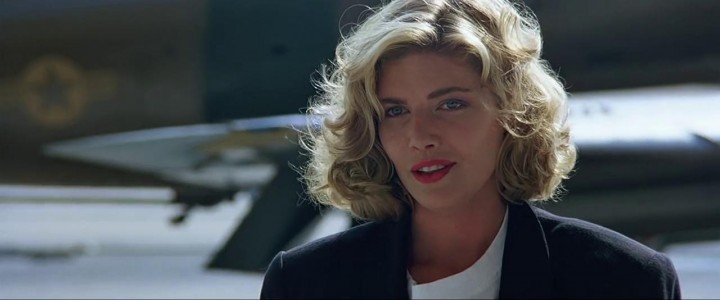
Notably, Top Gun became iconic for the death of a key character (spoiler alert for a nearly-30-year-old film!) in Goose, whose injuries upon ejecting from an out of control jet and subsequent plummet into the ocean below, gave rise to one of the most heartbreaking bromances in cinematic history. It’s the ultimate beer-swilling relationship of masculinity, mutual respect and brotherhood you’ll see outside of an episode of Sex & The City. The fact that “Maverick and Goose” have become part of the cultural shorthand for friendship between males speaks volumes for just how much Top Gun’s adrenaline-fuelled stock plot resonated with teenagers of the 80’s; similarly, or perhaps conversely, there’s a lot to be said for Thelma and Louise’s pop-culture iconic status amongst women, although now that status seems to lag behind Carrie Bradshaw and her troupe of screeching sex-starved female patsies.
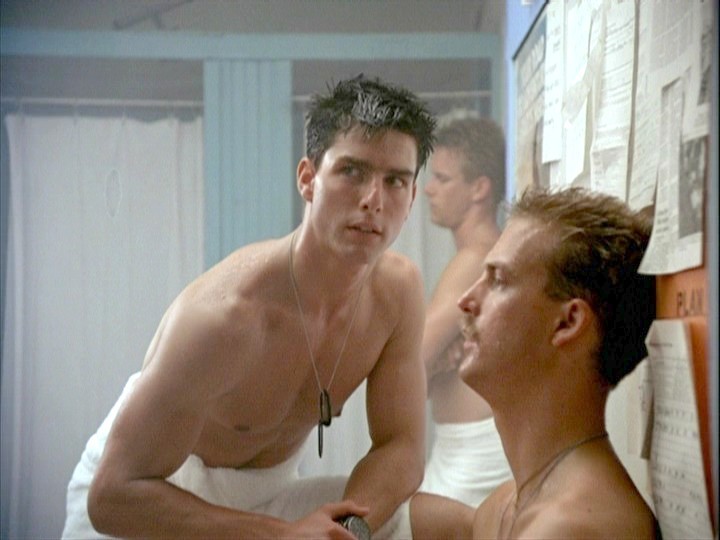
Top Gun was written by Jim Cash and Jack Epps, a duo who seem to think female authority figures are purely there for men’s amusement and sexual pleasure, whilst the Freudian iconography of jet fighters, aircraft carriers and copious locker-room dressing downs appears to modern eyes as antiquated misogyny run rampant. There certainly is a large swathe of obvious misogyny here, hidden below a backdrop of characters whose sole purpose in the movie is to yell, scream, and enunciate pilot terminology and the rules of engagement, instead of anything resembling human emotion. Hell, there’s barely an ounce of human emotion anywhere within this movie, with the exception of a young Meg Ryan, who plays Goose’s wife/widow. Tom Cruise’s Maverick displays the emotional range of a carpet bag, whilst Tom Skerritt, James Tolkan and Michael Ironside personify the chisel-jawed, sweaty-browed commanders of the Naval squadron Maverick works for with as much chest beating as Tony Scott can muster. A side note: is it just me, or do they lack air conditioning inside modern aircraft carriers?
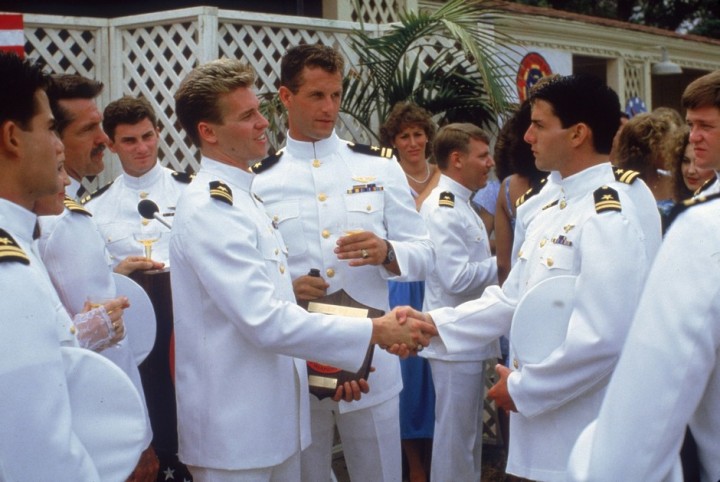
Tony Scott’s direction here is steadfastly American Hollywood. Unlike his last films, where his use of digital rack-zooms, shaky-cam excess and fragmented framing gave me convulsions of brain spasm, Top Gun is as methodically solid as any 80’s action film. Remember, Top Gun was out well before Die Hard came along and changed the game; Scott’s use of editing in the aerial combat sequences is frantic but always discernible, never losing the story or the character in a frenzy of rapid cuts and swirling camerawork. The film’s visual style is overly patriotic, and especially positive towards military combat (the MiG pilots are merely faceless cannon-fodder for the US to blast out of the sky, making their fate circumspect by comparison to Goose’s fatal plunge), so in many ways this pre-dates Michael Bay’s overt nationalistic style by two decades. The sunset-shot is overused again here, with Cruise riding his motorcycle across the film with windswept hair and orange afterglow coddling his youthful features – it’s prototypical propaganda stuff, and most certainly makes the best use of the young star’s looks.
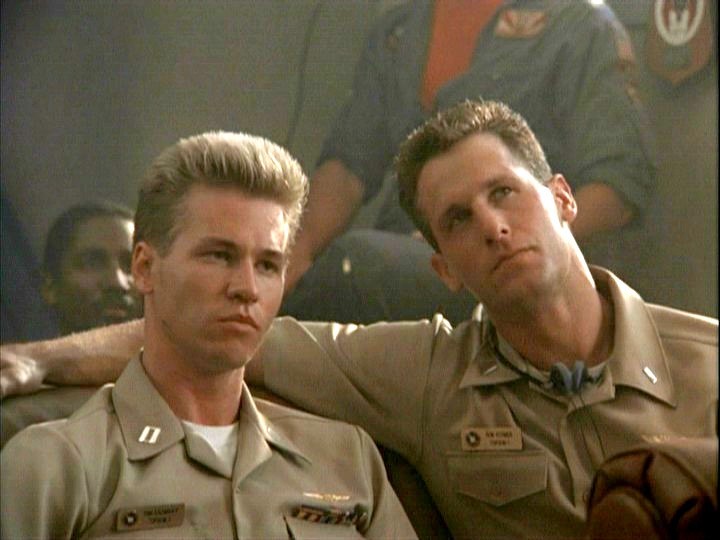
Top Gun’s major problem is with its dramatic arc. The film flies and rockets to success with the aerial sequences, yet when the characters open their mouths to speak, there’s the solid smack of crash-n-burn. Top Gun isn’t strong on depth of emotion, nor is it strong when Cruise and McGillis have to pretend to be attracted to each other (seriously, she seems about ten years older then him!), and watching actors of the quality of Tom Skerritt utter such risible “dialogue” against this story is the stuff cinematic nightmares are made of. Still, the film’s success seems to negate much of the criticism levelled against it – either that, or people are just stupid. The characters exist in an emotional vacuum, and as such the film’s plodding dramatic moments make for either awful, or amusing viewing, depending on your mindset.
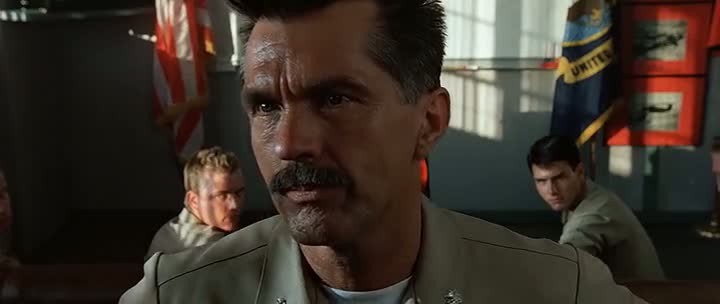
Look, don’t get me wrong: Top Gun is a blast of 80’s metal scoring and rip-roaring jingoistic militarism. There’s a heap of idiotic stuff here to enjoy, including Val Kilmer’s teeth-gnashing performance as Ice Man, Meg Ryan’s classic line “Take me to bed or lose me forever” (because fidelity is apparently predicated on sexual prowess), and the blink and miss it turn of Tim Robbins in a minor role behind Cruise late in the film. Not to mention the Cruise/McGillis sex scene, which took everyone’s breath away by being one of the most unromantic moments ever captured on celluloid. It gave us the Kenny Loggins classic, “Danger Zone”, no less than four times as a music cue, and stretched your admiration of heavy metal guitars being used as a film score to breaking point. As a film, it’s crucially lacking moral standards, character development or dependable scripting, yet works in spite of all this because it has bang bang planes and one of cinemas best bromances.

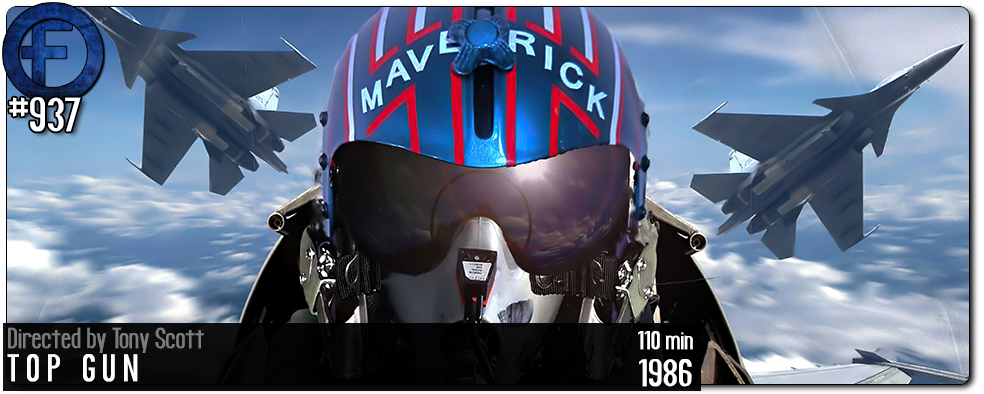
I gotta say I love it flaws and all. The flaws are real and much more obvious now that when I saw it in the theater as a teenager. But it is an unquestionably 80's film and with that comes a certain amount of corn. I think that is the lens I look at Top Gun through which makes me a little more forgiving than I might be with other flicks.
Indeed, I think the screenwriters were munching corn whilst typing this one up. Thanks for dropping in Keith!!